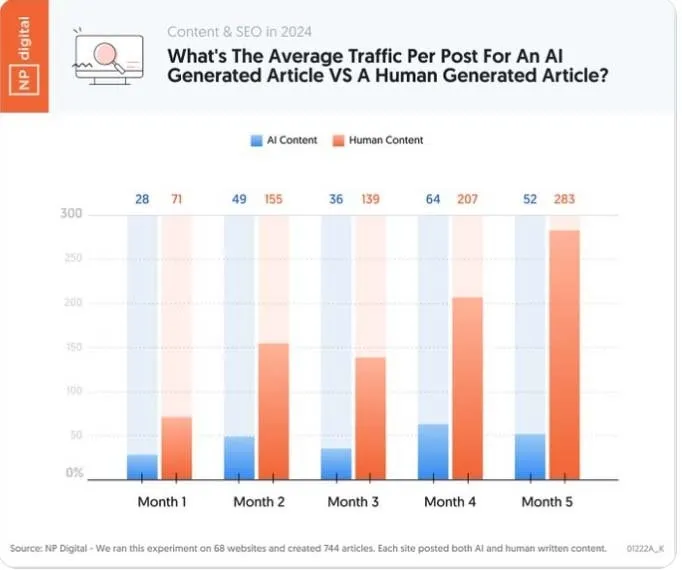
“Blogging is dead.”
I’ve been hearing this sentiment for years.
It was dead back in 2013 when we started our digital agency, and it’s been dying every year since.
But here you are reading this article.
Yes, podcasting has been the go-to medium for many influencers to reach their audience these past few years. Even better is a video podcast. That way, you can distribute it on YouTube as well. Cut that video into bite-sized clips, slap some subs, and you can 10x your reach by posting them on Reels, TikTok, Shorts, and even LinkedIn.
We now have AI tools that give us instant answers. What used to take hours of research, such as going through Google search results and reading multiple blog articles, now takes seconds if you run your queries through Perplexity AI.
So, what’s blogging’s place in all this? With people’s attention span shrinking, do people even bother reading blogs? Is it still a viable option for businesses to reach their audience online and drive sales?
The short answer is a resounding ‘yes!’
Now I have to prove why.
The stats
Let’s get straight to the (data) points:
- Over 2.5 billion blog posts are published each year worldwide.
- 77% of Internet users read blogs.
- 80% of bloggers report that blogging drives strong marketing results.
- 71% of B2B buyers consume blog content during their buyer journey.
- Companies that prioritize blogging see 13x higher ROI than non-blogging companies.
- The most popular blog niches are food, lifestyle, and travel.
- The global content marketing industry is expected to reach a $2 trillion market size by 2032.
- Between 2024 and 2031, the SEO industry is predicted to grow at a CAGR of 25.54%.
Should we end it here?
Not quite.
Because now I’m curious why—despite the growing popularity of video, podcasting, social media, and generative AI—blogging still endures (and grows) as a major contributor to effective digital marketing for all kinds of businesses.
The staying power of a blog in digital marketing
You’ll often hear people say that nobody really reads these days. That people no longer have that kind of attention span. It’s all about quick hits—a 30-second video, a short audio clip, a snappy tweet (yes, I still call them tweets). Don’t get me wrong, there’s a place for all that, and I like to consume some of that content.
But, as the stats above indicate, blogging is going strong. Growing, even.
Why?
It’s good for SEO
A blog is the most effective way to improve your website’s search rankings and drive organic traffic. Of course, you have to make sure that your content is keyword-optimized and really answers your target audience’s most pressing questions.
It’s suitable for establishing authority and subject-matter expertise
Do you want to prove to your target market that you know what you’re doing and are a reliable expert? There’s no better way to do that than putting your thinking and unique point of view into words. The most successful experts write. There’s just no way around it.
It’s best for educating your audience
Despite the popularity of other content types, there’s no better way to explore and communicate complex ideas than a well-written article. The written word is irreplaceable for that kind of communication. It’s skimmable, searchable, highlightable, and can quickly be reorganized and summarized in your own words (in your head or through rewriting).
It’s cost-effective
A decent computer, a good writer (most likely yourself), a simple website, and an internet connection. That’s it. No fancy equipment needed.
It can easily be repurposed
From a single blog post, it’s possible to produce numerous social media posts (text, image, or video), perhaps one or two newsletters, and maybe even a podcast episode. Long-form written content can live many lives outside the blog page. It should be at the core of your content marketing plan.
It’s evergreen
One thing that discourages me (this is personal; I don’t speak for my team) from being active on social media is the short shelf-life of posts. It doesn’t matter how viral one social media gets or how clever and creative the execution is—you have to keep doing the same thing every day. No wonder online creators are burning out right and left before they even earn a decent living. You have to “always be creating.” It’s hard to sustain that kind of lifestyle. Well-written blog posts, on the other hand, provide long-term value, driving traffic and leads for years to come.
As you can tell, I’m a big fan of blogs (and text in general). I love to read, and based on the data above, it looks like many people do, too. Text will always be around. It’s been with us since the ancient Sumerians invented a writing system more than 5,000 years ago (perhaps even earlier) and will still be with us no matter what trendy app, medium, or technology comes along.

This old post by graydon2 sums it up perfectly for me. Here are some choice quotes:
“…text is the most powerful, useful, effective communication technology ever, period.”
Now, let’s talk about the latest technology disrupting the creation of written content.
How does AI affect blogging?
It’s no secret that AI has disrupted content creation and consumption for the past year. We’re still grappling with its implications and its role in our work, especially for knowledge workers. So far, here are the major effects of AI on the relevance of blogging and SEO that I’m seeing:
Keyword research has become more efficient
It used to take me an entire workday to conduct comprehensive keyword research using tools like Semrush, Google Search Console, and Google’s search engine results page. Now, AI tools can process and analyze large datasets to identify high-value keywords, search trends, and content gaps that my team can target for client blogs. We still use the tools above for cross-checking, but the entire keyword research process has been cut down to just an hour or so.
Research in no time
In the past, I had to read numerous articles and sift through pages of search results to find the right information and data on a specific topic. The reading alone could take an entire day, sometimes more. These days, with the right question or series of prompts, Perplexity Pro can find precisely what I’m looking for in just a few seconds. For me, research is the one area where AI is making a massive impact on how we produce content.
Faster content creation and optimization (with one caveat)
Yes, AI can help automate and streamline content creation, making producing high volumes of content optimized for target keywords and topics faster and more efficient. AI writing assistants can generate drafts, outlines, and even entire articles based on prompts. And yes, AI tools can analyze existing content and provide recommendations for improving SEO factors like keyword density, readability, and structure. But how does all this automation affect the quality and creativity of the written content? Quantity is only half the battle. Let’s talk about that next.
AI needs human intervention
If it takes only a few minutes to write an article using AI, that only means that, inevitably, businesses will crank out more and more content in the hopes of ranking higher in search results and driving more traffic to their sites. However, based on initial data, businesses relying solely on AI-generated content without human oversight and editing are struggling to rank well, as search engines emphasize expertise, authority, and trustworthiness (E-A-T) factors. Undoubtedly, AI cannot—and in my opinion, will not—replace human creativity, insight, and expertise. A recent study by Neil Patel came up with the same conclusion (see the chart below).

“Traffic for the AI-generated content fluctuated from month-to-month while the human content had steady increases over the 5-month period. In fact, by month 5, the human-generated content had 5.44X more traffic than the AI-generated content on a monthly basis.”
So, my answer to the primary question of this article is that small business owners (talking now to our target audience) relying heavily on online marketing should still maintain a well-written and optimized blog. You should use AI to accelerate research and create first drafts, but it doesn’t mean you should skimp on a good human writer. They are more valuable than ever. Why? Because AI made mediocre content accessible to all.
If you need help developing a content strategy, our team of expert writers and strategists are more than willing to assist.
